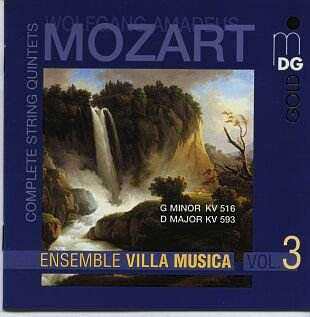I first encountered Ensemble Villa Musica in a little-known
but (in some quarters) highly-regarded recording (Naxos, 8.550388) of
the Schubert String Quintet. That version was beautifully played: I remember
being challenged by it on account of their mastery of ‘middle-statement’
– nothing overdone, nothing overlooked – which seemed to me to enable
them to speak a great truth. Of course taking the centre road can result
in blandness, in seeming lack of interest. Alternatively, it can enable
the composer’s voice to be heard, unimpeded by any kind of recreative
distortions, the like of which ‘big-name’ performers sometimes find difficult
to avoid.
Like everything else Mozart wrote in G minor, K516
is music from heaven. How on earth can mere man pen music of such beauty,
such perfection? But is it not also music written by a troubled mind,
contemplating heaven? Who can say! I once argued, passionately, but
pointlessly, with a talented student of mine who had failed to hear
the voice of tragedy in this music: why, even professional musicians
and commentators are divided on defining its precise emotional outlook,
especially the major key finale!
I raise this issue (of the ‘meaning’ of this music)
because performances vary widely according to the way artists answer
(or are inclined to answer) such questions. I must admit that I was,
initially, luke-warm in my reaction to this new recording by Ensemble
Villa Musica. Why? Because tempi are brisk, imparting an almost breathless
urgency to the music, even (comparatively speaking) in the divinely
beautiful slow movement. And because dynamic detail and the emotional
temperature are deliberately contained. Note that I say ‘deliberately’
contained: I’m sure this is the case, that it’s a conscious decision
to state – rather than understate or overstate – and to allow the music
to speak for itself.
The alternative way is to hold back, giving the music
more room to breathe, allowing phrases to be shaped more overtly, and
highpoints to be underlined more tellingly. While such an approach can
in extremis impart a self-pitying Mahlerian quality, it can also,
ironically, make the music sound more secure, more decisive, even self-confident
– qualities few would ascribe to this fragile music.
Ensemble Villa Musica impose nothing of themselves
on this music: the result is disturbingly restless, but their role is
in no way intrusive. And, if the mood of the music is less than certain,
who is to say that that is not how Mozart wanted it? Interestingly,
this approach makes the G major finale (always a particular problem:
is this forced optimism, or merely the other side of the same emotional
coin?) less obviously resolute, more fitting, more fulfilling.
Complete recordings of the Mozart String Quintets usually
means the perfect coupling (of the two most sublime and substantial
pieces, K515 in G minor and K516 in C major) never comes your way, because
the other discs in the series will have much shorter playing times.
Never mind: the later D major piece is an undoubted masterpiece, from
his last months in this world – elegant and entertaining, despite being
contemporary with the valedictory B flat Piano Concerto. However, the
experience of hearing K516 is likely to leave you so exhausted, emotionally,
that you’ll probably want to have your remote control to hand; or may
be you’ll simply assign K593 to another listening session.
The sound-world of the D major is altogether brighter,
its ‘meaning’ anything but mysterious. So, when the cellist poses questions
gently to his colleagues (a rising dotted arpeggio, in the slow introduction
to the first movement) the answers come easily in the form of a smiling
lyrical phrase on the upper instruments. And the Haydn-ish humour of
the rondo finale’s playful theme of falling semitones – which some early
editions ‘corrected’ – is in sharp contrast to the yearning chromaticism
of K516. It’s all lovely stuff, and it’s enchantingly played.
Much though I admire this disc, it wouldn’t be my first
or only choice of G minor: there are others (Grumiaux on Philips 422
511-2; the Lindsays on ASV CDDCA 923; or Hausmusik on Virgin VCD 45169-2
– probably in that order) who are apparently more involved, and
therefore more involving. But I am the first to concede that a more
detached account such as Villa Musica’s can, paradoxically, allow
us to dig deeper still. With its gorgeous K593, it’s a fine CD, and
worth anyone’s money.
Peter J Lawson


![]() See
what else is on offer
See
what else is on offer 